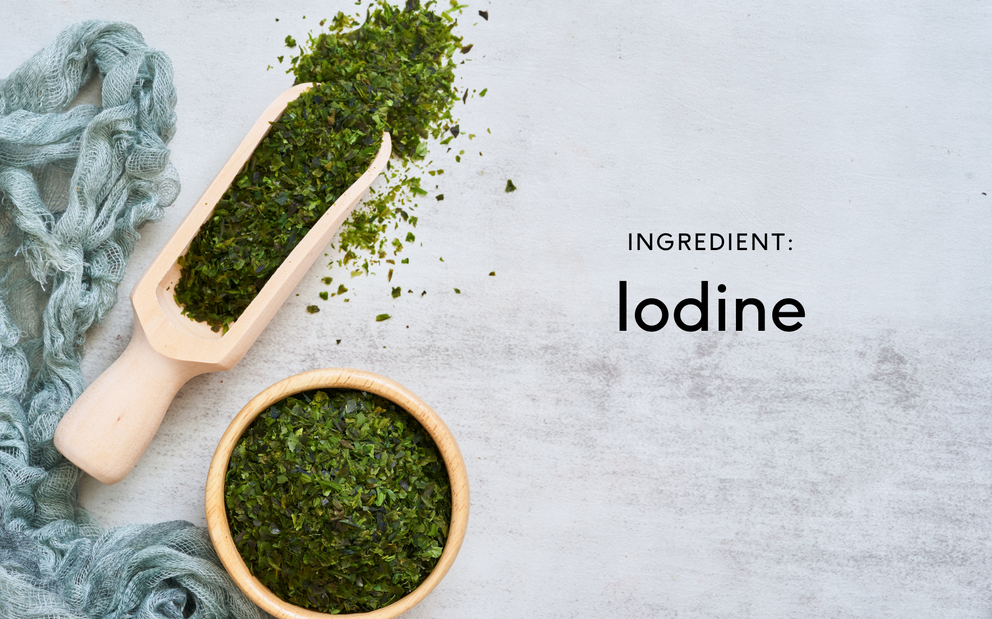Learn About Iodine in 5 Minutes
Table of contents

What is iodine?
Iodide is an essential mineral used to create thyroxine (T4) and triiodothyronine (T3), which are the two thyroid hormones that modulate your thyroid system and control your metabolism, heart rate, and female reproductive health.
- Balances your heart rate to keep your energy levels up
- Keeps your brain healthy to prevent cognitive issues
- Keeps your hair and skin robust
- Ensures that you have a healthy pregnancy and regular periods
- Prevents goiter to keep unsightly conditions like goiter away
Why we love iodine
Your body needs plenty of iodine to keep your thyroid gland functioning effectively. This gland is responsible for tons of processes in your body, and when it’s out of balance, your health can get out of whack faster than you’d think.
The thyroid gland regulates your metabolism, so if you don’t have the right amount of iodine in your body, you could rapidly gain or lose weight. This gland is also intimately involved in female reproductive health, and it even affects how fast your heart beats. Taking a daily iodine supplement is the best way to make sure that your body has enough iodine to keep your thyroid functioning effectively, which is why we’re proud to feature your daily dose of potassium iodide in Feel.
Unbelievable benefits of iodine
Here are some of the top benefits of taking a daily iodine supplement that research science has confirmed:
Thyroid Hormone Deficiency Benefits
When your body doesn’t have enough thyroid hormone, your thyroid gland goes into overdrive. To meet the body’s demand for thyroid hormone, this gland adds new cells, which leads to the enlargement of your thyroid. If this process goes unchecked, it leads to a condition called goiter in which your enlarged thyroid causes noticeable neck swelling.
Making sure that your diet contains enough iodine is the best way to ensure that your thyroid creates enough iodine without enlarging itself. When you stabilise your iodine levels, goiter usually goes away on its own, but this condition can require surgery.
Since your thyroid gland controls your metabolism, not having enough iodine in your system can lead to sudden weight gain. Weight that you gain due to iodine deficiency is hard to lose unless you get your thyroid in balance, and iodine deficiency can also make you feel cold all the time.
Neurological Benefits
People with higher thyroid hormone levels do better on tests, and scientists have discovered that healthy thyroid activity is associated with increased cognitive ability. Low thyroid levels can actually impede the growth and development of your brain, and when you have a chronic iodine deficiency, your hippocampus shrinks. The hippocampus is critical for memory and learning, so any diminishment in the size of this brain structure will impede your ability to process and retain information.
Reproductive Benefits
Women who are pregnant need to consume enough iodine for two, and they are highly susceptible to thyroid hormone deficiency, which causes hypothyroidism. Pregnant women who have iodine deficiency give birth to babies with lower birth weights, and when mothers don’t have enough iodine when they’re breastfeeding, their babies have developmental issues.
Iodine deficiency during pregnancy even increases stillbirth rates. What’s more, when you don’t have enough iodine, your period will be heavier and more painful.
Preconception, Iodine is a key mineral for fertility, and previous studies have linked iodine deficiency with reduced fertility. Feel Pregnancy includes 100% of the NRV for Iodine: 150μg.
Hair and Skin Benefits
Scientists have linked thyroid deficiency to hair loss. When you don’t have enough iodine, your hair follicles can’t regenerate, and they eventually die. This condition also leads to skin breakdown, which can cause your skin to feel dry and flaky.
Cardiovascular Benefits
The thyroid gland controls your heart rate, and iodine deficiency can lead to a dangerously slow heart rate. When your heart rate is too slow, you have less energy, and you could even become dizzy or lose consciousness.
Is iodide water-soluble or fat-soluble?
Iodine is readily soluble in water. Therefore, your body absorbs it quickly, and it doesn’t tend to build up in your tissues.
Where can iodine be found naturally?
Dietary iodine is most plentiful in seaweed, and this nutrient is also present in dairy and certain types of fish. Since the mid-20th century, most types of table salt have been fortified with iodine.
5 foods/drinks containing iodine
1. Seaweed (up to) 2,000% DV per 1g
2. Cod 66% DV per 85g or 1/5 of 1 fillet
3. Yogurt 50% DV per 1 cup or 128g
4. Milk 37% DV per 1 cup or 128g
5. Shrimp 23% DV per 85g
What is the recommended daily intake for iodine?
According to the National Institutes of Health (NIH), the recommended daily amount (RDA) for iodine is 150mcg. This amount increases to 220mcg for women who are pregnant and 290mcg for women who are lactating.
How much seaweed do I need to take to get a full daily dose of iodine?
Different types of seaweed have different amounts of iodine. A gram of nori, for instance, which is used to make sushi, contains about 25% of your RDA for iodine, but other types of sushi might contain much higher concentrations.
What to consume to get a full daily dose of iodine?
Cod - approximately 125g or 1/3 of a fillet
Yoghurt- approximately 256g
Cow's milk - approximately 3 cups or 384g
Prawns - approximately 340g
Potatoes - approximately 2 medium potatoes
Can you absorb enough of iodine from food?
It’s possible to get enough iodine from food; for omnivores, it’s relatively easy to get this nutrient from dairy products and seafood, and for vegetarians and vegans, nori and other types of seaweed are rich in iodine. This substance is also present in table salt, but it might be easier to know you’re getting your exact DV of iodine by taking supplements.
Why is iodine necessary for your body?
Iodine is a critical component in the operation of your thyroid system. This system, which is centralised in the thyroid gland in your throat, controls most of your bodily functions that have to do with timing. From heart rate to digestive metabolism, your thyroid system makes sure that bodily processes proceed at the correct pace, but without enough iodine, things go awry fast.
Functions of iodine
Thyroid system functions: Without enough thyroid hormone, your thyroid gland will try to work overtime and enlarge. If this gland enlarges to a significant degree, a condition called goiter can occur.
Neurological functions: Adequate thyroid levels support proper neurological development, and they prevent psychiatric conditions.
Hair and skin functions: Proper thyroid hormone levels help maintain your skin and hair health.
Female reproductive functions: Hypothyroidism while pregnant reduces birthweight, and it also increases the likelihood of stillbirth.
Symptoms of iodine deficiency
Neck Swelling
Severe hypothyroidism causes goiter, which is an enlargement of the thyroid gland that occurs as this organ attempts to produce sufficient levels of thyroid hormone. Severe cases of goiter may require subtotal or total thyroidectomy, which is the surgical removal of the thyroid gland.
Weight Gain
When you don’t have enough thyroid hormone, your metabolism decreases, and your likelihood to become overweight or obese increases.
Feeling Cold
If you feel cold even when the people around you feel warm, you could be suffering from iodine deficiency. This symptom is a common result of hypothyroidism.
How long do you need to take iodine to start experiencing it's benefits?
You may notice improvements in energy within one month of supplementing with iodine.
Consistency is key and our research recommends taking your Feel supplements for at least 3 months to allow your body to adjust and provide the desired benefits.
How long does it take for your body to digest/absorb iodine?
Iodine has an incredibly high absorption rate. According to some estimates, your body may absorb as much as 96.4% of the iodine you consume.
How long does iodine stay in your body after you take it?
The only place where iodine builds up is in your thyroid gland. Otherwise, your body excretes this essential nutrient within 24 hours.
Is iodine an antioxidant?
Medical researchers aren’t quite sure whether iodine is a direct antioxidant. Some research seems to indicate that this mineral directly eliminates reactive oxygen species, and whatever the case may be, it’s clear that iodine is a potent anti-inflammatory substance.
Can you overdose on iodine? What are the effects?
If you overdose on iodine, you could throw your thyroid system out of balance and develop hyperthyroidism. This condition occurs when you have too much thyroid hormone in your system, and symptoms of hyperthyroidism include feeling hot, losing weight, and constant hunger.
Temporary symptoms of mild iodine poisoning include diarrhoea, nausea, and a burning sensation in your mouth. Symptoms of severe iodine poisoning include weak pulse, airway swelling, cyanosis, and coma. Make sure you avoid these symptoms by limiting your daily iodine intake to the RDA for your age and status.
Does iodine dissolve, flush out, or build up in the body?
Most of the iodine you consume flushes out of your body within 24 hours, and a small amount of this element remains in your thyroid gland for significantly longer.
Can you take iodine during a diet?
Taking iodine supplements doesn’t interfere with dietary restrictions, and by treating hypothyroidism, iodine supplementation may even help you lose weight.
Are there synthetic forms of iodine?
It’s practically impossible to synthesise elemental iodine. Forms of iodine which are created in a lab, such as potassium iodide, can technically be called synthetic.
Why might synthetic forms of iodine be better?
Interestingly, one type of treatment for hypothyroidism is the administration of synthetic thyroid hormone. This type of treatment is also used in the case of partial or total thyroidectomy. It’s important to keep in mind, however, that synthetic thyroid hormone and iodine are completely different substances.
Absorption rate of synthetic iodine
A formulation of elemental iodine and would likely have the same high absorption rate as the natural element.
Why might natural forms of iodine be better?
Natural iodine has absorption rates as high as 95%. You can’t get much better than that.
How to take iodine
You can consume iodine in food or in supplement form.
Iodine trends in medicine
A 2019 study demonstrates that iodine treatment shows promise for cutaneous inflammatory disorders, which are debilitating conditions that result in periodic bouts of inflamed skin lesions. Further research will likely discover even more applications of this highly beneficial nutrient.
Why everyone should be taking WeAreFeel supplements
Your thyroid system needs to stay in perfect balance to remain in proper working order. If your thyroid hormone levels stray to either side of the equation, you’ll experience metabolic issues, and you might even need to undergo thyroid surgery.
Unfortunately, many supplements on the market provide far more iodine than you need. Too much iodine can be just as bad as too little of this essential mineral, but here at WeAreFeel, we provide you with exactly 150mcg of iodine in each daily capsule of Feel!
Here’s the Proof
- Physiology of the Hypothalamic-Pituitary-Thyroid Axis
- The role of thyroid hormones in the control of energy expenditure.
- Hypothyroidism - new aspects of an old disease
- Thyroid Hormones Are Associated With Cognitive Function: Moderation by Sex, Race, and Depressive Symptoms
- The role of iodine in brain development.
- Hippocampal volume is decreased in adults with hypothyroidism.
- Health Consequences of Iodine Deficiency
- Reproductive failure in women living in iodine deficient areas of West Africa.
- Hypothyroid symptoms and the likelihood of overt thyroid failure: a population-based case-control study.
- Thyroid and the Heart























































 Back
Back





